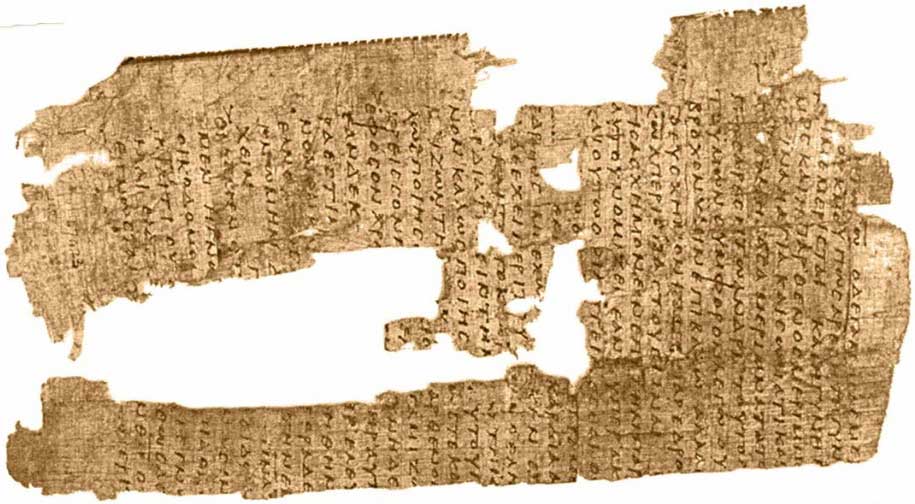What's in store for ThyMindOMan.com? Where have we been, and where are we going? The Gift is being invited into my life and yours, as are some great new offerings.
Category: scriptures
Ephesians 1 BHT, "Paul" talks about the Grace of Christ in All Beings
An addition to the BHT, where Paul (or a disciple of Paul) talks about the infinite Grace that Christ is found in all beings, and the type of wondrous insight and knowledge that God reveals in those who attain the consciousness of Christ.
1 Thessalonians 1 BHT, Paul's First Words about the Word in the New Testament
An addition to the BHT, which may be the very earliest words written in the New Testament, around 50 AD, in Paul's letter to the family who are gathering in Thessaloniki. Paul is exuberant about their faith, and talks about how they knew it for themselves through the manifestation of the Spirit in themselves, after much suffering, just like Paul and Jesus. Their great example was quickly spreading abroad.
Paul/Silas? our Super Hero Identity vs. our Alter/Secret Identity
I wonder if Silas/Silvanus could be Paul's nickname for his own alter ego, the "Saul" of his prior persecuting life, his shadow side, his human side, his "sinful" side, prior to perhaps taking a "new name" of Paul after his conversion experience.
Reconstructing the narrative surrounding the origins of the Book of Mormon
It's taken more time to write about this reconstruction, because it is perhaps a more sensitive subject, and more complex, than any I have written before about Mormonism or Christianity, yes, even more so than Jesus or Joseph Smith (which might be an indication that something is off-kilter). The Salt Lake City based Latter-day Saints take the Book of Mormon very seriously as a holy text, as scripture revealed by God, similar to the Bible, and perhaps even more important than the Bible. The Book of Mormon is one thing that makes them unique, their own testament of the divinity of "Jesus Christ," which they believe is also evidence of the unique prophethood of Joseph Smith and the divinity of the church he organized as God's "true church." But I think the truth may be much more nuanced.
A Psychological and Mystical Interpretation of the Myth of Adam & Eve and the Garden of Eden
I think the story of Adam & Eve is a mythological allegory describing humanity's "fall" of consciousness into the dualities of self-awareness, subject/object relationships, and the opposites of existence. This is symbolized in the partaking of the "tree" of knowledge of good and evil, i.e. dualities.
1 Corinthians 15 BHT, Paul’s Earliest Witness of the Resurrection into Christ Consciousness, the “Gospel”
An addition to the BHT, containing the earliest account of the post-resurrection appearances of Christ in the New Testament, where Paul describes his witness of the resurrection and what it means to be resurrected into Christ consciousness. This seems to be an excellent summary of the Christian Gospel, or "good news," but it is something which I think we've generally misunderstood in Christianity for centuries. I feel that this is one of the most important translations of the BHT that I have been given the Grace to work out yet—yet not I. I was in tears by the end.
Romans 8 BHT, Liberation is Life in Christ Consciousness
An addition to the BHT, where Paul describes how we are liberated from the suffering of the ego in the life of Christ consciousness, or the Spirit, and all are beneficiaries of this consciousness, from which we cannot ever be separated.
Paul and the Early Jewish Christians’ Mystical Resurrection “in” Christ
I've been reading about the post-resurrection appearances of Christ, and the description of the earliest written records and development of the early Christian resurrection narrative is quite intriguing. It seems to show that there was a significant change of the meaning of resurrection beginning in the very first few decades of Christianity, between the time of Paul and when the gospels were written.
“Canticle of the Sun,” by St. Francis of Assisi, and Joseph Smith’s “Olive Leaf”
One of the last things we did at the seminar with Bernard McGinn this past weekend was read through and discuss Saint Francis of Assisi's poem and religious song Canticle of the Sun. McGinn considers this to be a very mystical text from Francis, as Francis seems to see God powerfully in and throughout the whole of creation, including in the sun, moon, stars, Earth, etc. McGinn noted that it is a kind of nature mysticism. Francis wrote most of it in the year 1224, and the last few lines in 1226 just before his death.









